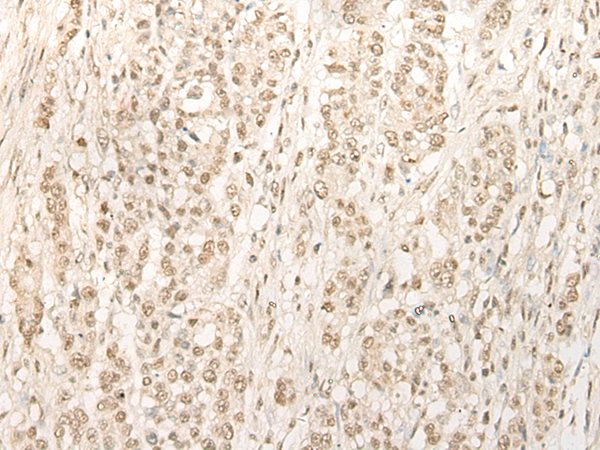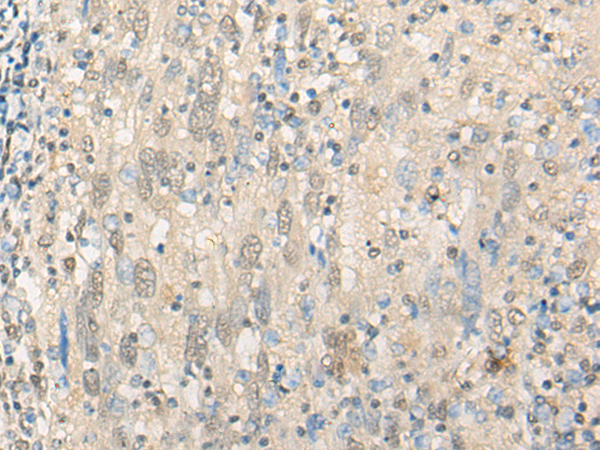

| WB | 咨询技术 | Human,Mouse,Rat |
| IF | 咨询技术 | Human,Mouse,Rat |
| IHC | 1/25-1/100 | Human,Mouse,Rat |
| ICC | 技术咨询 | Human,Mouse,Rat |
| FCM | 咨询技术 | Human,Mouse,Rat |
| Elisa | 1/5000-1/10000 | Human,Mouse,Rat |
| Aliases | p10; PCH1B; RRP40; Rrp40p; CGI-102; hRrp-40; bA3J10.7 |
| Host/Isotype | Rabbit IgG |
| Antibody Type | Primary antibody |
| Storage | Store at 4°C short term. Aliquot and store at -20°C long term. Avoid freeze/thaw cycles. |
| Species Reactivity | Human, Mouse |
| Immunogen | Fusion protein of human EXOSC3 |
| Formulation | Purified antibody in PBS with 0.05% sodium azide and 50% glycerol. |
+ +
以下是关于EXOSC3抗体的3篇参考文献示例(基于公开研究整理,具体文献需核实数据库):
1. **文献名称**:*EXOSC3 mutations in pontocerebellar hypoplasia alter RNA metabolism pathways*
**作者**:Boczonadi V, et al.
**摘要**:研究通过Western blot和免疫荧光技术,利用EXOSC3抗体揭示其突变导致RNA外切体功能异常,与儿童神经退行性疾病(如PCH1型)相关。
2. **文献名称**:*The exosome and RNA quality control in the eukaryotic cell*
**作者**:Wan J, et al.
**摘要**:文章使用EXOSC3抗体进行免疫共沉淀实验,证明EXOSC3作为外切体核心组分,参与mRNA降解及核糖体RNA加工的质量调控机制。
3. **文献名称**:*EXOSC3 deficiency disrupts stem cell homeostasis by impairing rRNA biogenesis*
**作者**:Tsuboi T, et al.
**摘要**:通过免疫组化和流式细胞术结合EXOSC3抗体,发现EXOSC3缺失导致干细胞中rRNA成熟受阻,影响细胞增殖和分化。
**提示**:以上为示例框架,具体文献信息建议通过PubMed或Google Scholar以“EXOSC3 antibody”为关键词检索,并筛选涉及抗体应用的实验研究。
The EXOSC3 antibody is a tool used to detect the EXOSC3 protein, a critical component of the human exosome complex. The exosome, a multi-subunit machinery conserved across eukaryotes, plays a central role in RNA processing and degradation. Specifically, it mediates 3'→5' degradation of various RNA substrates, including mRNAs, rRNAs, and non-coding RNAs, ensuring cellular RNA homeostasis. EXOSC3 (Exosome Component 3), also known as RRP40 or hRrp40. forms part of the exosome’s nine-core protein structure and is essential for its structural integrity and enzymatic activity. Mutations in the EXOSC3 gene are linked to pontocerebellar hypoplasia type 1B (PCH1B), a severe neurodegenerative disorder characterized by impaired brain development, highlighting its biological significance.
Antibodies targeting EXOSC3 are widely employed in research to study exosome assembly, RNA metabolism, and disease mechanisms. They enable the detection of EXOSC3 expression levels, subcellular localization (primarily nuclear/cytoplasmic), and interactions via techniques like Western blotting, immunohistochemistry, and immunofluorescence. Such studies have clarified EXOSC3’s role in ribosome biogenesis, mRNA surveillance, and its tissue-specific expression patterns. Additionally, EXOSC3 antibodies aid in exploring pathogenic mutations, as PCH1B-associated variants often destabilize the exosome, leading to RNA processing defects. These tools are vital for advancing understanding of RNA biology and developing therapeutic strategies for exosome-related disorders. Commercial EXOSC3 antibodies are typically validated for specificity using knockout controls or siRNA-based depletion.
×